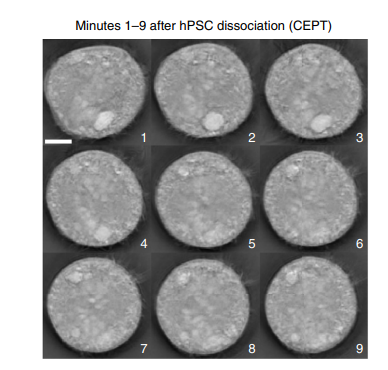Better Method for Growing Stem Cells Could Speed Gene-Editing Therapies
April 7, 2023
Recently, NCATS researchers devised a four-part cocktail of small molecules that can protect stem cells from damage when they are grown in the laboratory. This advance could make stem cells more useful for studying and treating diseases and testing drugs. In a follow-up article in Nature Protocols, the team explained step by step how to use the cocktail to grow a group of genetically identical cells called human pluripotent stem cells (hPSCs) from a single cell.
HPSCs are cells that, in theory, can grow forever. They potentially can serve as an endless source of brain, kidney, heart and other cell types. But stem cells are sensitive, and their possible uses in medicine have been hampered by cellular stress associated with growing these cells in a dish. This can damage DNA and lead to cell death.
“Poor cell viability and inefficient growth of stem cell lines from a single cell are major bottlenecks in the stem cell field,” said Carlos Tristan, Ph.D., acting director of the NCATS Stem Cell Translation Laboratory (SCTL). “A faster, more robust protocol to generate single-cell-derived hPSC lines has been a goal for stem cell biologists.”
Tristan, former SCTL director Ilyas Singeç, M.D., Ph.D., and their colleagues showed how their cocktail, combined with gentle cell manipulation, can improve a process called single-cell cloning, where one cell at a time is cultured in a tiny well of a cell culture plate.
The researchers used microfluidics technology to place stem cells in culture plates with the small-molecule cocktail. The approach proved to be an effective way to expand a single hPSC into cell lines of identical cells.
The team’s published guidelines will help speed the cocktail’s wider use for single-cell cloning, which holds great promise for gene editing-based therapies. Gene editing aims to correct misspellings in the DNA sequence that often lead to disease. Scientists can take stem cells from a person with a disease caused by a single gene mutation and use gene editing technology to fix the error.
An improved approach to growing stem cells will allow scientists to use gene editing on hPSCs both to study the effects of disease-causing mutations and to correct genetic mutations in disease cells. In addition to gene editing, scientists can use single-cell cloning to create cell lines for studying such diseases as cancer and for testing drugs.
“With better single-cell cloning, we will be able to compare the normal, corrected stem cells to those carrying a mutation,” Tristan said. “These genetically matched cells will help with research into the mechanisms underlying genetic diseases, drug screening, and therapeutic development.”



